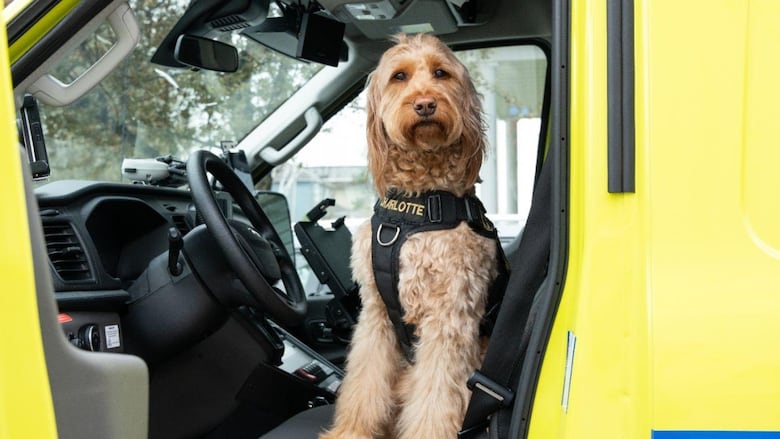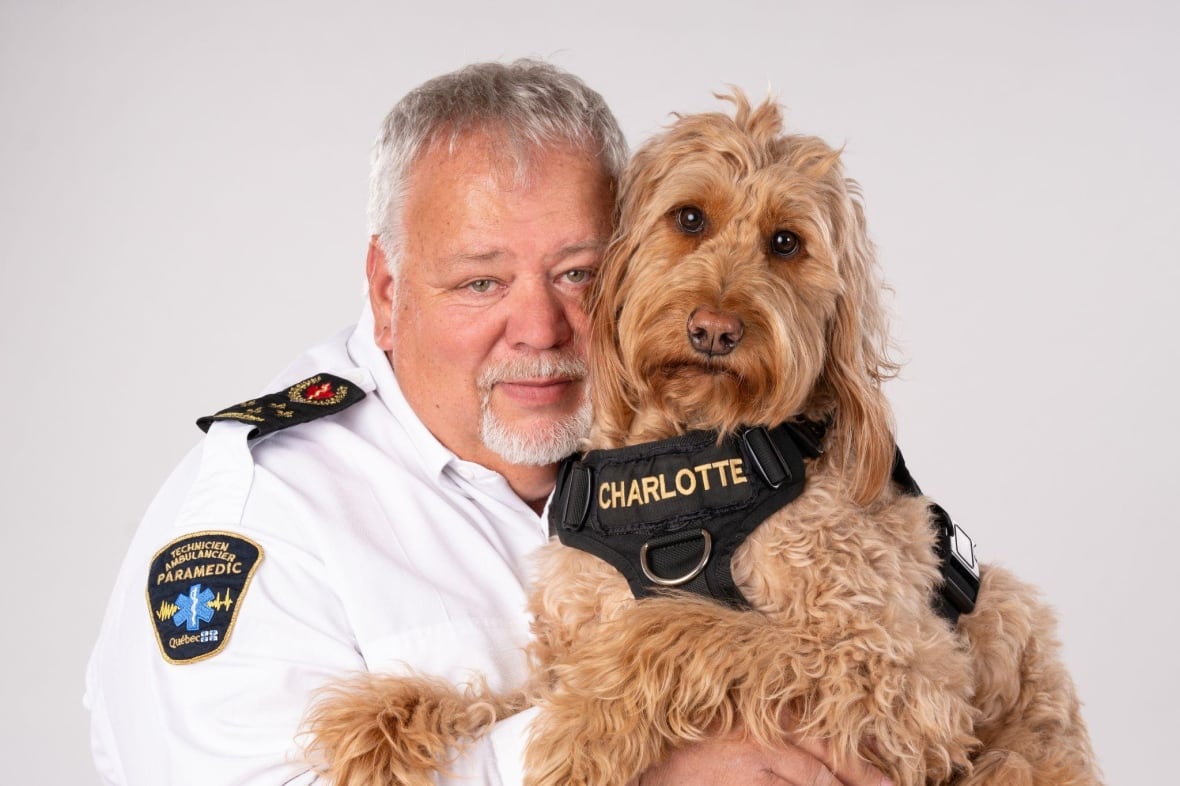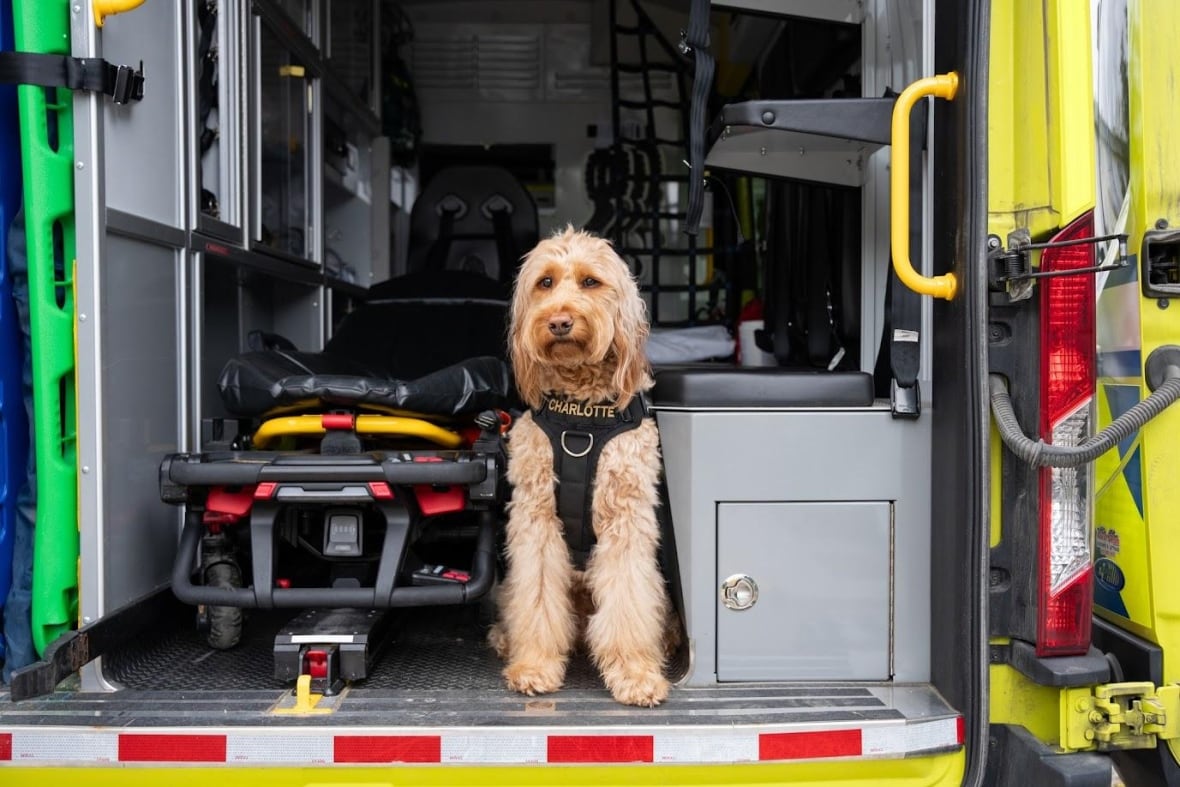Meet Charlotte, a canine first responder bringing pawsitivity to a Quebec community
Charlotte’s role has made her part of the fabric of Mont-Laurier, Que., says handler

Equipped with her customized vest, Charlotte the golden doodle keeps a busy schedule. For the past four years, she's been responding to emergency calls with a paramedic team in Mont-Laurier, Que.
The five-year-old therapy dog and her handler Marc Paquette with Les Ambulances Y. Bouchard et Fils have followed ambulances to help deliver death notices, offered support for people with suicidal thoughts and intervened in cases involving autistic patients.
Her skill is providing comfort and support, says Paquette.
"It often starts with eye contact," he said. "She looks like a big stuffed animal, very harmless, and she's trained to be calm."
He says Charlotte's presence has become integral in the Laurentians town of 14,000, and her unique role has allowed the first responders to not only gain trust among patients but also improve crisis management in the field.
"Charlotte is an integral part of the pre-hospital care system," said Paquette. "We're available every day, evening or night, to assist the public."

In her four years of service with the team, Charlotte's presence in the community has turned her into a quasi celebrity, joked Paquette. She's recently been asked to help provide support in court, to provincial police and residents in care homes.
"She's well known and has become part of the fabric of Mont-Laurier," he said. "It's not rare that when I'm walking, people ask me 'Where's Charlotte?'"
De-escalating situations
Initially, Charlotte started her training with Paquette when she was three months old with the goal of becoming a service dog to support first responders. But Paquette decided to take it further.
"To really bring it into the community and to respond to interventions in the field," he said.
"We enter people's homes. We defuse crises."
Paquette says he knows of other support service dogs working with paramedics in the province, but he isn't sure they're as integral to their team as Charlotte is to his.
The main benefit of this program is how she has improved crisis management, says Paquette.
When Charlotte approaches an individual in crisis, Paquette says 90 per cent of the time, the individual starts opening up. He says her presence sometimes prevents paramedics from having to bring people into the hospital network because of the dog's ability to de-escalate situations.

"Once the crisis has been defused ... we are able to refer them through 811 to other psychosocial resources," said Paquette.
"Before, the only place [to] transport was the emergency room."
A complex training program
Charlotte was trained at Mélanie Boucher's dog school in Sainte-Thérèse, Que., L'AcadémieChien.
President and founder of the school, Boucher says the dog's success is not Charlotte's alone, but speaks to the commitment of her handler, who also put in hours of training.
The duo had to go through three levels of obedience school and Charlotte had to complete between 160 to 180 hours of training, she says.
Charlotte was the first dog the school trained for a team of paramedics. Since then, about 20 have gone through the program to serve with other professionals. The school has trained about 100 dogs for a variety of needs since 2018, she says.
It's quite a complicated training process to train dogs to serve in a professional setting. It takes about a year, considering the school is preparing dogs to meet a variety of individuals in less-than-ideal circumstances, says Boucher.
"Unlike assistance dogs that we train for individuals ... [Charlotte] has to be able to approach people" she said.
"We teach the dogs to go and apply pressure points to bring comfort to people … let's say to lean on them, on their knee, on their chest, wherever the person needs it."
Dedicated to the dog's training, Paquette would make the commute from his Laurentians town to the school just outside of Montreal regularly, says Boucher.
"I'm proud of Charlotte, but I'm just as proud of Marc [Paquette]," said Boucher.

